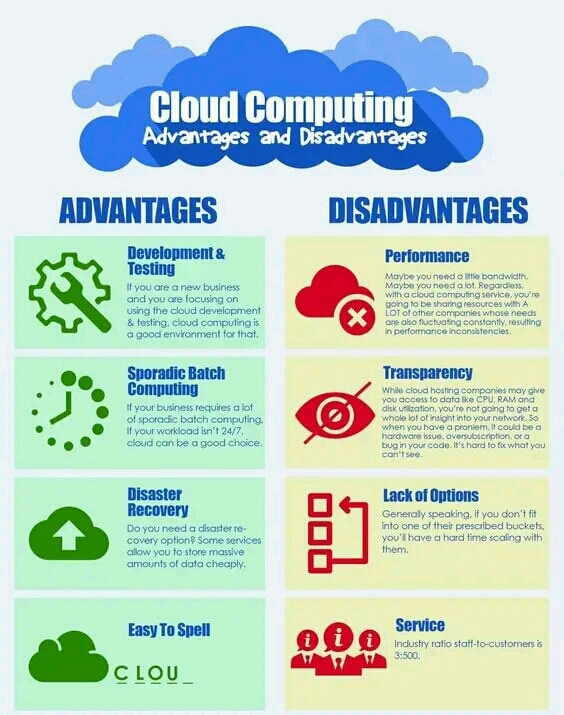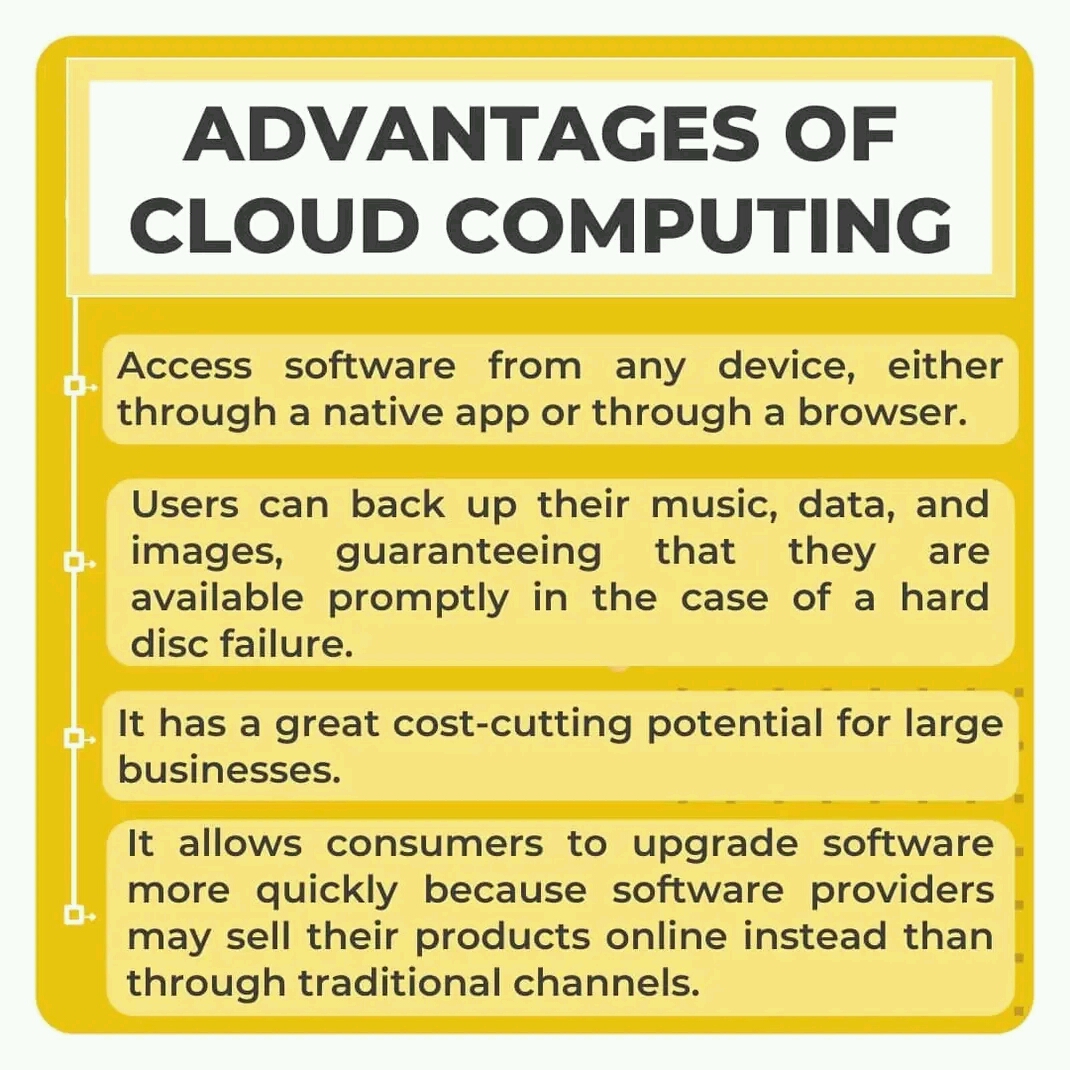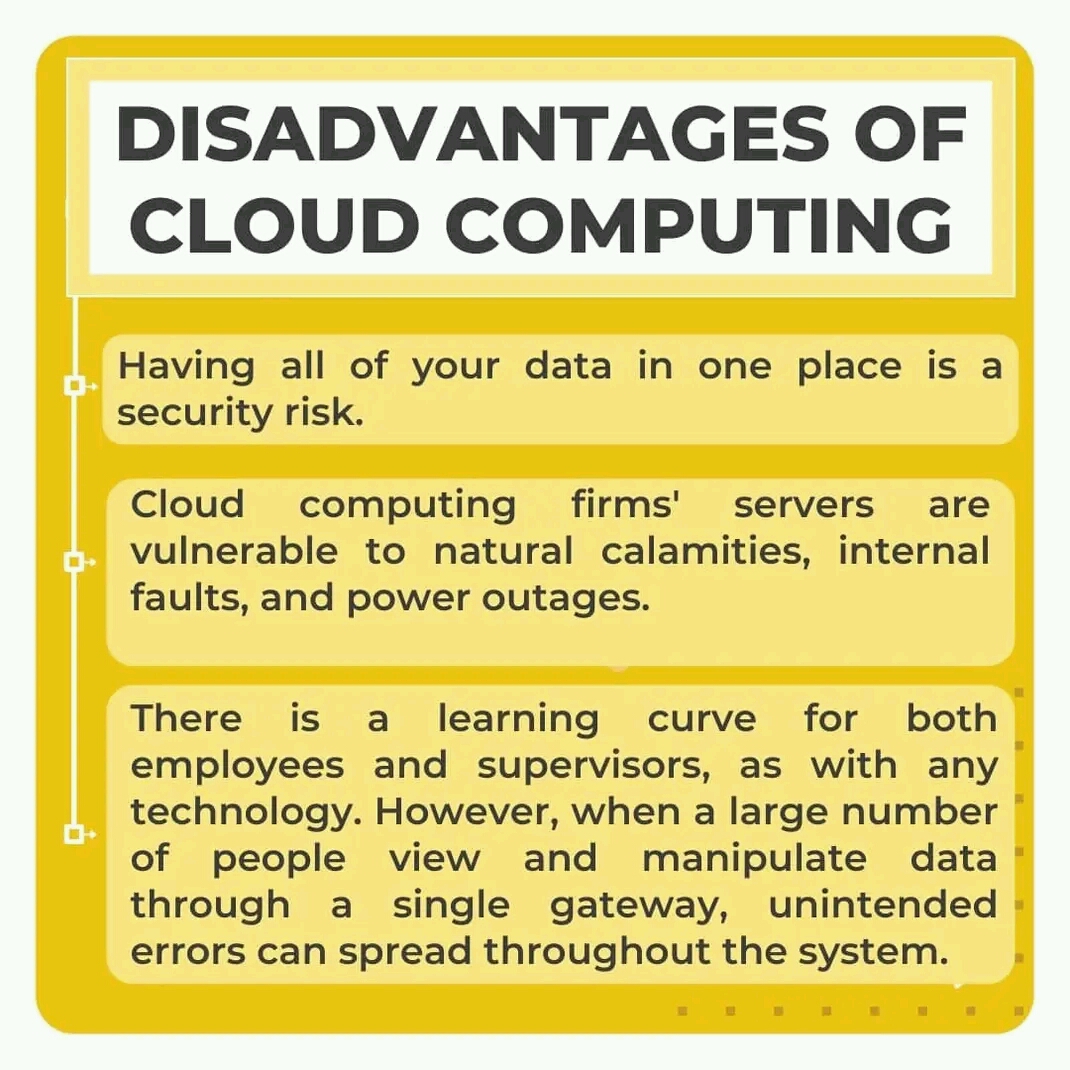The Advantages And Disadvantages of Cloud Computing

The Advantages And Disadvantages of Cloud Computing
Cloud computing refers to the on-demand availability of computer system resources, particularly data storage and computational power, without the user having to manage them directly. Functions in large clouds are frequently dispersed over numerous locations, each of which is a data centre.
Simply described, cloud computing is the transmission of computer services over the Internet (“the cloud”) in order to provide speedier innovation, more flexible resources, and economies of scale.

The Advantages And Disadvantages of Cloud Computing
Cloud computing is now evolving like never before, with companies of all shapes and sizes adapting to this new technology. Industry experts believe that this trend will only continue to grow and develop even further in the coming few years. While cloud computing is undoubtedly beneficial for mid-size to large companies, it is not without its downsides, especially for smaller businesses. We now bring you a list of advantages of disadvantages of cloud computing, with a view to helping such establishments fully understand the concept of cloud computing.

Advantages of Cloud Computing
If used properly and to the extent necessary, working with data in the cloud can vastly benefit all types of businesses. Mentioned below are some of the advantages of this technology:
Why Cloud Computing Is Ideal for Small Businesses
• Cost Efficient Cloud computing is probably the most cost efficient method to use, maintain and upgrade. Traditional desktop software costs companies a lot in terms of finance. Adding up the licensing fees for multiple users can prove to be very expensive for the establishment concerned. The cloud, on the other hand, is available at much cheaper rates and hence, can significantly lower the company’s IT expenses. Besides, there are many one-time-payment, pay-as-you-go and other scalable options available, which makes it very reasonable for the company in question.
• Almost Unlimited Storage Storing information in the cloud gives you almost unlimited storage capacity. Hence, you no more need to worry about running out of storage space or increasing your current storage space availability.
• Backup and Recovery Since all your data is stored in the cloud, backing it up and restoring the same is relatively much easier than storing the same on a physical device. Furthermore, most cloud service providers are usually competent enough to handle recovery of information. Hence, this makes the entire process of backup and recovery much simpler than other traditional methods of data storage.
• Automatic Software Integration In the cloud, software integration is usually something that occurs automatically. This means that you do not need to take additional efforts to customize and integrate your applications as per your preferences. This aspect usually takes care of itself. Not only that, cloud computing allows you to customize your options with great ease. Hence, you can handpick just those services and software applications that you think will best suit your particular enterprise.
• Easy Access to Information Once you register yourself in the cloud, you can access the information from anywhere, where there is an Internet connection. This convenient feature lets you move beyond time zone and geographic location issues.
• Quick Deployment Lastly and most importantly, cloud computing gives you the advantage of quick deployment. Once you opt for this method of functioning, your entire system can be fully functional in a matter of a few minutes. Of course, the amount of time taken here will depend on the exact kind of technology that you need for your business.

Disadvantages of Cloud Computing:
In spite of its many benefits, as mentioned above, cloud computing also has its disadvantages. Businesses, especially smaller ones, need to be aware of these cons before going in for this technology.
The Advantages And Disadvantages of Cloud Computing
The Risks Involved in Cloud Computing:
• Technical Issues Though it is true that information and data on the cloud can be accessed anytime and from anywhere at all, there are times when this system can have some serious dysfunction. You should be aware of the fact that this technology is always prone to outages and other technical issues. Even the best cloud service providers run into this kind of trouble, in spite of keeping up high standards of maintenance. Besides, you will need a very good Internet connection to be logged onto the server at all times. You will invariably be stuck in case of network and connectivity problems.
• Security in the Cloud The other major issue while in the cloud is that of security issues. Before adopting this technology, you should know that you will be surrendering all your company’s sensitive information to a third-party cloud service provider. This could potentially put your company to great risk. Hence, you need to make absolutely sure that you choose the most reliable service provider, who will keep your information totally secure.
• Prone to Attack Storing information in the cloud could make your company vulnerable to external hack attacks and threats. As you are well aware, nothing on the Internet is completely secure and hence, there is always the lurking possibility of stealth of sensitive data.
Native cloud technologies allow organizations to create and run scalable applications in modern dynamic environments, such as public, private and hybrid clouds: examples of this approach are containers, service grids, microservices, immutable infrastructure, and declarative APIs.
?
These methods allow loosely coupled systems to be stable, manageable, and observable. Combined with reliable automation, they allow engineers to make essential changes frequently and predictably with minimal effort.
?
Databases are just a tiny part of the crowded landscape of cloud computing.
?
Look closely, and you will notice a wide range of offerings: traditional relational databases and NoSQL databases supporting various data models, including key/value, document, and graph. You will also find technologies that combine clustering, querying or schema management capabilities on top of existing databases. And it doesn’t even consider related categories in the CNCF landscape, such as streaming and messaging for moving data or cloud storage for saving.
?
What Are The Characteristics of a Cloud Database?
Let’s go back to the definition of CNCF and extract the characteristics of a cloud database that will help us achieve our cost and time-to-market goals:
?
Scalability: The system must add capacity to cope dynamically with the additional workload.
?
Elasticity — it should also be able to decrease so that you pay only for the resources you need.
?
Fault tolerance — the system must withstand failures without losing your data.
?
Observability — tracking your activity, health check, and bounce handling.
?
Automation is the implementation of operational tasks in the form of repeatable logic to reduce the probability of error. This characteristic is the most difficult to achieve, but it is necessary to achieve high delivery rates at scale.
?
A cloud database is a database designed with cloud principles in mind, including scalability, elasticity, fault tolerance, observability, and automation.
The Three Main Successes And Failures of Cloud Computing
Security in the cloud is a huge win. About five years ago, cloud security became better than traditional systems, although most of us did not notice it.
?
The downside is that most of these innovation dollars came from the security budget of more traditional installations. Innovations for private data center systems continue to lag in all areas of vendor development.
?
The cloud can successfully provide business flexibility. I always tell my clients that most businesses have moved to the cloud because of perceived cost savings but stayed for flexibility. The cloud allows businesses to turn IT into a penny, and companies that are moving quickly in today’s more innovative markets (such as retail, healthcare, and finance) are discovering that the speed at which cloud systems can change provides a real force multiplier for businesses.
?
The cloud provides industrial-level reliability. Most of those who opposed cloud computing argued that we would put all our eggs in a basket that might not be reliable. That has never happened, for the most part.
?
Obviously, there were interruptions, and they usually made up a 24-hour news cycle, but they didn’t come close to the amount or duration that the skeptics predicted.
?
If you are thinking about cloud computing, you should consider what benefits these successes can bring to your enterprise. But first, read on. It’s time to see what went wrong.

?
The Three Main Failures of Cloud Computing
A colossal failure in costs. In the early days, almost every vendor and aspiring cloud computing expert promoted the cloud as a cheaper (or much cheaper) alternative to traditional systems. Companies that switched to cloud computing expected significant cost savings. These savings never materialized, except for new businesses that had not previously invested in IT.
?
The abundance of choice has a downside. The ability to use thousands of cloud services from a cloud provider and the ability to use even more when switching to a multi-cloud led to excessive complexity due to too much heterogeneity.
?
The rise of cloud computing has exacerbated the skills crisis. We cannot put this problem on the shoulders of cloud providers. The rapid transition to cloud technologies has led to a shortage of qualified workers, which is why many enterprises have frozen in place until they get the skills they need in the state.
?
These Are The Main Pros and Cons of Cloud Computing.
Mostly, it was a good step and a severe evolution of technology consumption. There are always pros and cons to any new technology. If your company is at the beginning of the path to cloud technologies, use this information to achieve goals and eliminate obstacles.
In Conclusion
Like everything else, cloud computing too has its pros and cons. While the technology can prove to be a great asset to your company, it could also cause harm if not understood and used properly.
SEE ALSO : Cloud Computing & Cloud Migration And Their Benefits
Hope this post on The Advantages And Disadvantages of Cloud Computing is helpful?
Comments are closed.